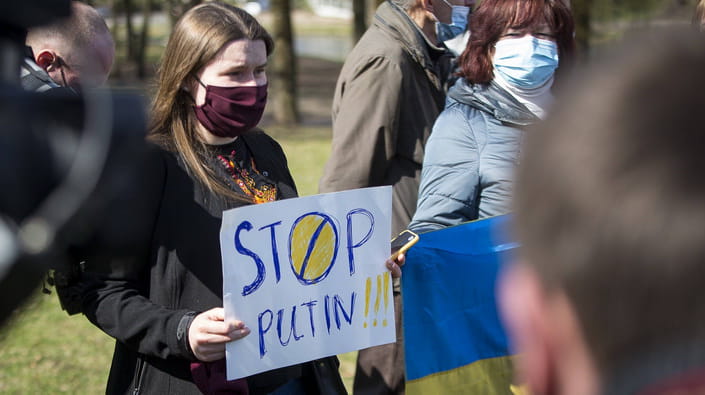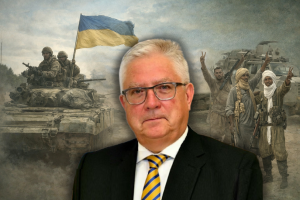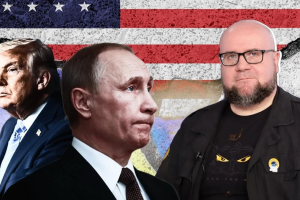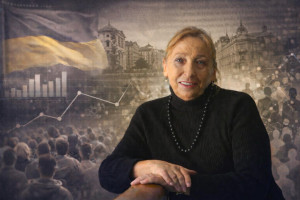The limits of compromise for Biden & Putin: Ukrainians’ views of the future of occupied Crimea and Donbas
Source: European Pravda
Public sentiment has always been a reference for the Ukrainian authorities when conducting negotiations and settlement talks with Russia. The current situation is no exception.
In the run-up to the NATO summit and the Biden-Putin meeting in Geneva, a recent nationwide survey conducted by the Ilko Kucheriv Foundation for Democratic Initiatives in collaboration with the Razumkov Center reveals the current mood in Ukrainian society.
It presents landmarks and signals what the Ukrainian people really want, and therefore, what Kyiv’s policy can or should be. It also informs the Ukrainian government about specific opportunities and pitfalls.
The signals are very important for the negotiations that will take place in Geneva. They rule out the possibility of a “bigger agreement” between Russia and the West without Ukraine’s participation, because no agreement reached can be legitimized by the Ukrainian side… even if the Ukrainian authorities agreed to it. The strongest signal is an absolute ‘NO’ to the “surrender of Crimea” in return for peace in the Donbas.
There is no need to convince Ukrainians that there is a war between Ukraine and Russia – 71% are firmly convinced of this, while 15% have the opposite opinion.

Here and further – graphics from a presentation by the Ilko Kucheriv Foundation for Democratic Initiatives
This is the consensus in all of Ukraine, including the eastern regions. Although there are some nuances with regard to the actual definition, the majority of Ukrainians (53%) believe that the war is due to Russian aggression with active assistance of local militants.

On the other hand, there are alarm signals in the southern and eastern regions. One in four persons considers the situation in eastern Ukraine “an internal conflict where Russia supports one of the parties”, and another 15% call Russian aggression a “purely internal civil conflict”. Russia has been disseminating such propagandistic signals for years and repeatedly playing on them, with some success.
In November 2019, the Ilko Kucheriv Foundation for Democratic Initiatives conducted a survey where the same questions were posed. In 18 months, the number of pro-Russian sympathizers upholding the idea that there is a “purely internal civil conflict” in Donbas has significantly decreased, especially in the eastern and southern regions.
No less important is the electoral division. The idea that Russia is waging war against Ukraine in the Donbas is dominant among voters not only of the European Solidarity and Batkivshchyna parties, but also among those voting for the Servants of the People party.

Voters of these political parties also believe the following points: Russia fully controls the so-called “LNR/DNR”; the Russian army is fighting alongside local militants against the Armed Forces of Ukraine; Russia supplies weapons to occupied Donbas.

A strong unified position of political opponents in Ukraine is a safeguard against any agreements on the “surrender” of Ukraine’s interests.
It is almost impossible to “sell” Ukrainian society any conditional Western agreements with the Kremlin that would call into question Russia’s status as an aggressor. Ukrainians will not accept it!
It is also important that many voters of the Servants of the People party and supporters of President Zelenskyy do not support pro-Russian narratives, and this will create electoral pressure on the current government.
The only electoral group that differs significantly is the voters of the pro-Russian Opposition Platform-For Life, who usually support Russian narratives. However, their opinion is not decisive at the national or regional levels. This fact is also most important for Ukraine’s negotiations with the West, because it allows Ukraine to underline the stability and predictability of Ukraine’s position on this issue, regardless of the change of government.
No compromise on Crimea
There are concerns that Russia will try to “sell” a conditional peace in Donbas in return for the lifting of sanctions and, more importantly, for Kyiv’s de facto renunciation of Crimea.
Given that Crimea has completely disappeared from the news, it is quite possible that some western powers may have been entertaining such an idea.
Nevertheless, the Ukrainian authorities are now trying to change this state of affairs as they prepare to launch the Crimean Platform at the end of August. Although the significant messages of this event are yet to be worked out and announced, public opinion is largely in favor of such a discussion.
Only 7% of respondents believe that lasting peace in the Donbas can be achieved by agreeing to the autonomy of the Donbas and forgetting about Crimea. Even fewer (3%) believe that peace in eastern Ukraine can be attained by officially recognizing the annexation of Crimea.

In conclusion, although to date there have been no negotiations for the reintegration of Crimea, Ukrainian society categorically refuses any compromise on the Crimean issue. Secondly, a clear connection has been formulated: Ukrainians do not believe that lasting peace can be established in the Donbas even if it is “traded off” for Crimea.
The poll establishes four important points:
- Ukrainian society has no illusions about Russia and any future peace negotiations;
- Ukrainians perceive the war as a long-running standoff between Ukraine and Russia;
- Ukrainians no longer believe in quick decisions;
- under no circumstances can Crimea become a “bargaining chip”.

Not only should the authorities take advantage of this wave of public opinion, but they should also go further: prepare information and diplomatic platforms for a unified presentation of Crimea and Donbas in further negotiations.
Negotiations in the Minsk format are at a standstill; there is no significant progress in Normandy talks, and Germany and France are getting ready for the elections cycle, so there will be a further decline in negotiation dynamics.
In these conditions, it is quite possible that the Crimean Platform will play a new and important role in future negotiations with Russia. In this way, Ukraine would bring its negotiation strategy in line with reality. The conflict with Russia is systemic, and Ukraine needs to act systematically.
Challenges for Zelenskyy

Peace talks have become one of the key topics for Volodymyr Zelenskyy. Today, his efforts to resolve the war in the Donbas are supported by 38% of Ukrainian citizens, while 19% do not.

Thus, Zelenskyy has a certain level of confidence and room for maneuver even outside his own electorate. However, the president faces specific challenges.
First of all, most Ukrainians know very little about what the government is really doing. 28% of Ukrainians know nothing about Zelenskyy’s actions in the Donbas (another 15% are undecided).
From the point of view of public opinion, this is the main risk – losing the current balance between trust and distrust. Therefore, in order not to turn the current 38% into a lost opportunity, the Ukrainian government should take steps to finally inform the public about its policy in the Donbas.
In fact, the East is the only macro-region where Zelenskyy does not have unequivocal support for his efforts on the Donbas.
Thus, public opinion is divided almost equally between those who support (28.5%), those who are against (31%) and those who are not at all aware of such efforts (25%). Without the support of the war-affected region and the surrounding territories, any policies concerning the Donbas will significantly lose their legitimacy.

In February 2021, the Foundation for Democratic Initiatives conducted focus groups and surveys in the government-controlled territories near the front line. At that time, the majority of respondents were deeply disappointed with the government’s plans for peace, that is, with the non-fulfillment of the promises that Volodymyr Zelenskyy had actively voiced before his election and at the beginning of his term.
Voters in the Donbas voted for Zelenskyy because he promised peace. Today, they show their frustration, which has quickly grown into irritation and alienation, by responding negatively to the president’s words and plans.

One important fact must not be forgotten. Although the Opposition Platform-For Life party has lost the opportunity to communicate directly with its voters through its TV channels, pro-Russian and even Russian narratives remain deeply ingrained in the population. Moreover, it is nurtured and widely disseminated by Russian TV channels.
Therefore, the Ukrainian government must build a separate economic and political platform targeting the eastern regions. Otherwise, these regions will be permanently lost to Zelenskyy and will be used by Russia in its ongoing hybrid war against Ukraine.










